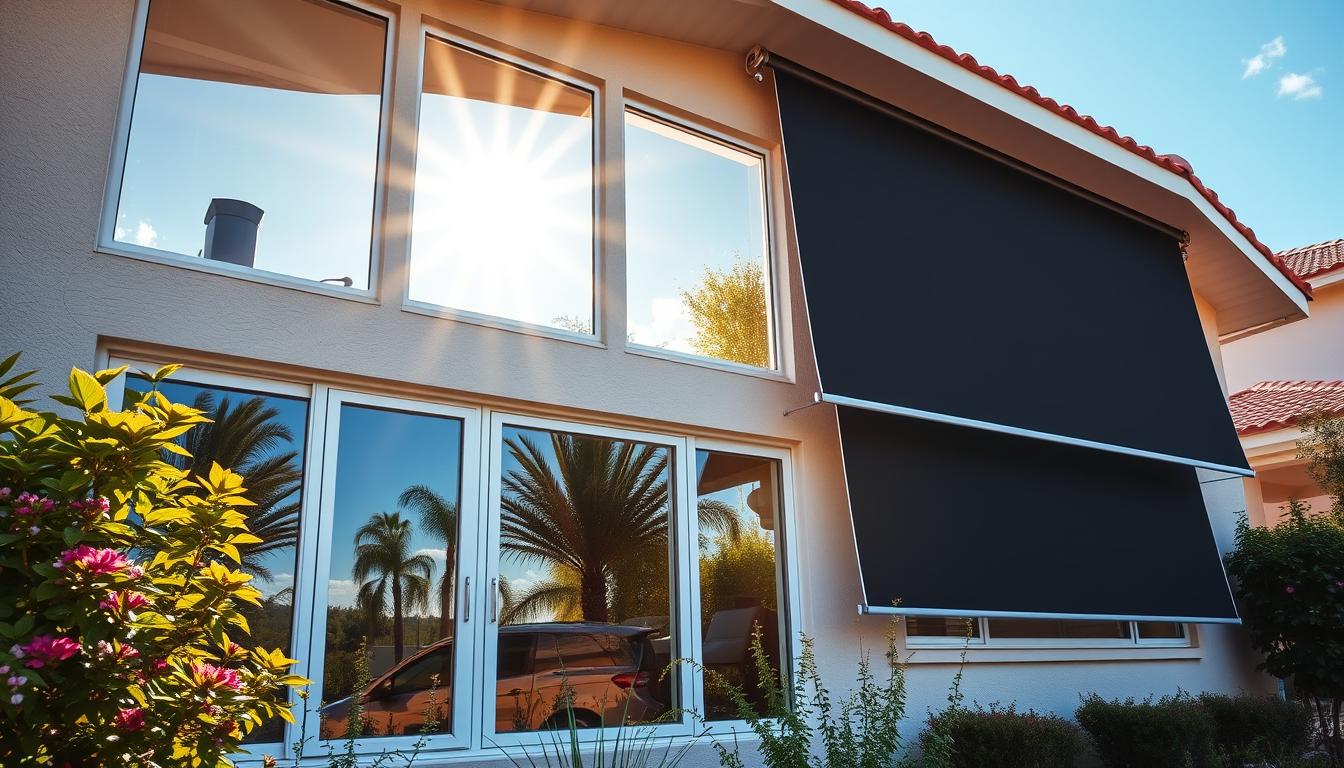Let’s explore the world of solar screens and their tax benefits. You might wonder if these screens are part of the energy efficiency and tax credits talk. Tax season could be a chance to save money and help the planet.
In this article, we’ll explain solar screen tax deductions. We’ll help you figure out if your solar screens can save you money. With the Inflation Reduction Act of 2022, it’s key to know about tax benefits for green home upgrades.
Key Takeaways
- Solar screens may provide tax savings through energy efficiency improvements.
- The Inflation Reduction Act of 2022 contributes to potential write-off home improvements.
- Solar window screens can enhance your home’s energy efficiency.
- Understanding the difference between tax deductions and credits is crucial.
- There are several limitations and eligibility rules to be aware of.
Understanding Solar Screens and Their Benefits
Solar screens are more than just a home trend. They are a smart way to enjoy the sun’s light without its harsh effects. With many types of solar screens out there, it’s key to know why they’re good for your home. They block UV rays that harm your furniture and keep your home cooler.
By learning about their benefits, you can pick the right one for your home.
What Are Solar Screens?
Solar screens are special window treatments. They block sunlight to keep your home cool while still letting you see outside. You can find them in various styles, such as:
- Solar control window films
- Safety solar control window films
- Exterior solar shades
These screens can go on the inside or outside of your windows. They add beauty and value to your home. Plus, they make your home more comfortable and efficient.
Energy Efficiency and Cost Savings
Solar screens make your home more energy-efficient, saving you money. They keep your home cool in summer, reducing the need for air conditioning. This can lower your energy bills.
They also protect your home from sun damage. This means your furniture and floors stay looking great. Solar screens are good for the planet and your wallet.
Tax Credits vs. Tax Deductions for Home Improvements
It’s important to know the difference between tax credits and deductions for home improvements. Homeowners need to understand how these tools can save money, especially with energy efficiency tax credits available.
Explaining Tax Credits
Tax credits are direct reductions in what you owe in taxes. They are different from deductions, which just lower your taxable income. Credits give you dollar-for-dollar relief.
Thanks to the Inflation Reduction Act, homeowners can get tax credits for energy-efficient upgrades after January 1, 2023. You can get up to a 30% credit on certain expenses. This includes home audits and specific upgrades like solar screens or heat pumps.
The maximum annual credit is $1,200 for energy property expenses. Some upgrades might even get you a credit of up to $3,200!
How Deductions Differ from Credits
Tax deductions reduce your taxable income, not your tax bill directly. For example, if you spend $1,000 on home improvements and your tax rate is 20%, you save $200. But, a $1,000 tax credit directly reduces your tax bill by that amount.
It’s crucial to know the difference between deductions and credits. Deductions just lower your taxable income. Credits, on the other hand, immediately reduce your tax bill. Understanding this can lead to big savings when making energy-efficient upgrades.
Are Solar Screens Tax Deductible?
With all the talk about saving energy, you might wonder if solar screens can help with taxes. Let’s explore how these upgrades could lead to tax savings. We’ll look into solar screen tax credit eligibility and how to claim energy efficiency credits.
Eligibility for Energy Efficiency Tax Credits
Before getting solar screens, check if they meet IRS standards. If they do, you might get energy tax credits for 2022. It’s key to ensure your screens are certified for the best tax benefits.
Looking for ways to make your home more energy-efficient? Start by checking if the manufacturer certified your solar screens. This step is crucial for saving on your taxes.
Home Improvements Eligible for Credits
Not every home improvement qualifies for energy tax credits. But, some do, like:
- Solar screens
- Windows and doors
- Skylights
- Insulation materials
Having the right documents, like invoices and certifications, is important. They help when you file IRS Form 5695. Keep these records safe to avoid any issues.
The Inflation Reduction Act of 2022 and Solar Screens
The Inflation Reduction Act makes solar screens eligible for a 30% tax credit. This credit can be up to $1,200 per year. It’s a big chance for homeowners to save on energy upgrades.
The credit will go down to 26% in 2033 and 22% in 2034. So, homeowners should act fast to get the most benefits. Don’t miss out on these savings before they disappear in 2034.
Steps to Claim Solar Screen Tax Benefits
Ready to claim solar screen tax benefits? Start by gathering your documents. Keep records of your purchase and installation costs, like invoices and receipts. This info is key for tax preparation and helps you save on your tax bill.
Next, follow the IRS tax form instructions carefully. You’ll need to fill out IRS Form 5695 for the Residential Clean Energy Credit. This form is crucial for claiming your solar tax benefit. After filling it out, report the numbers on your Schedule 3 and Form 1040.
If your tax liability is less than your credits, you can carry over the extra credits. This lets you maximize your energy efficiency investments. By following these steps, you can meet IRS requirements and enjoy the financial benefits of solar solutions for your home.








